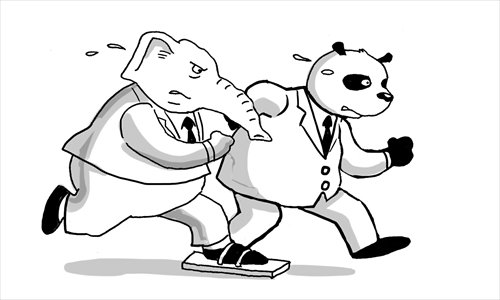Modi’s Nixonian pragmatism refreshes ties

Illustration: Liu Rui/GT
Indian Prime Minister Narendra Modi arrived in China Thursday. His first stop is the ancient city of Xi'an, also the hometown of Chinese President Xi Jinping. Modi's formal talks with Chinese leadership will take place Friday in Beijing, during which trade deals worth $10 billion is likely to be inked.
Modi will also discuss with Chinese leaders an array of issues, including the prolonged border disputes, the current trade deficit and their relations with other countries. Promoting economic collaboration and common development to propel Asia's rise are expected to be prioritized on the agenda.
Former Chinese leader Deng Xiaoping once said, "The 21st century can only be the Asian century if India and China combine to make it so."
To achieve common development, a stable and peaceful surrounding environment is needed.
Realizing regional security, including the stability in Afghanistan and the security in the Indian Ocean, requires concerted efforts from both China and India.
At present Washington is the major provider of security in the vast Indian Ocean, so if it exits, India will need the cooperation of other countries.
The boundary disputes are a conundrum in the bilateral relationship.
If they can't be solved at an earlier date, the two sides should more closely stick to the code of conduct they reached before.
During her China trip in January, Indian Foreign Minister Sushma Swaraj proposed that both sides should think "out of the box" for solutions to the border issue. It is not clear what such solutions are, but we hope border contention will not affect the bilateral cooperation.
In September last year during his first state visit to India, Xi put forward that China and India should work together to establish a closer partnership of development rather than becoming rivals in competition. Modi is considered as a state leader with strategic insights. He may become a Nixon-style statesman because of his pragmatism and capacity to resolve major contradictions between China and India and to tackle the common challenges of development.
There is indeed competition and a lack of mutual strategic trust between the two rapidly emerging Asian powers. Over the past year, India, under the Modi administration, has become a star on the world stage. Modi's victory in the country's general elections last May has injected enormous confidence into India's economic development as well as offering hope to the US, Japan and other nations attempting to take advantage of New Delhi to contain China.
New Delhi also holds an ambiguous attitude toward China's "One Belt, One Road" initiative, referring to the Silk Road Economic Belt and the 21st Century Maritime Silk Road, and other regional economic cooperation plans.
Though it joined the Asian Infrastructure Investment Bank (AIIB) as a founding member, there are suspicions among some Indian scholars that the bank will serve as an instrument of Chinese foreign and strategic policy.
India longs for economic integration in Asia. However, it is reluctant to see China acting as the single leader in the region but expects to share the role.
China put forward the "One Belt and One Road" vision and the AIIB initiative in a bid to ramp up regional economic cooperation and promote common development in Asia, or to build "a community of common destiny" in Xi's words. Every Asian nation can share the leadership.
It is a long-term task for the two sides to establish mutual strategic trust, but political resolutions of powerful leaders will inevitably accelerate this process.
The author is an assistant research fellow of Shanghai Institutes for International Studies and a visiting fellow of Chongyang Institute for Financial Studies, Renmin University of China. opinion@globaltimes.com.cn
Read more in Special Coverage: